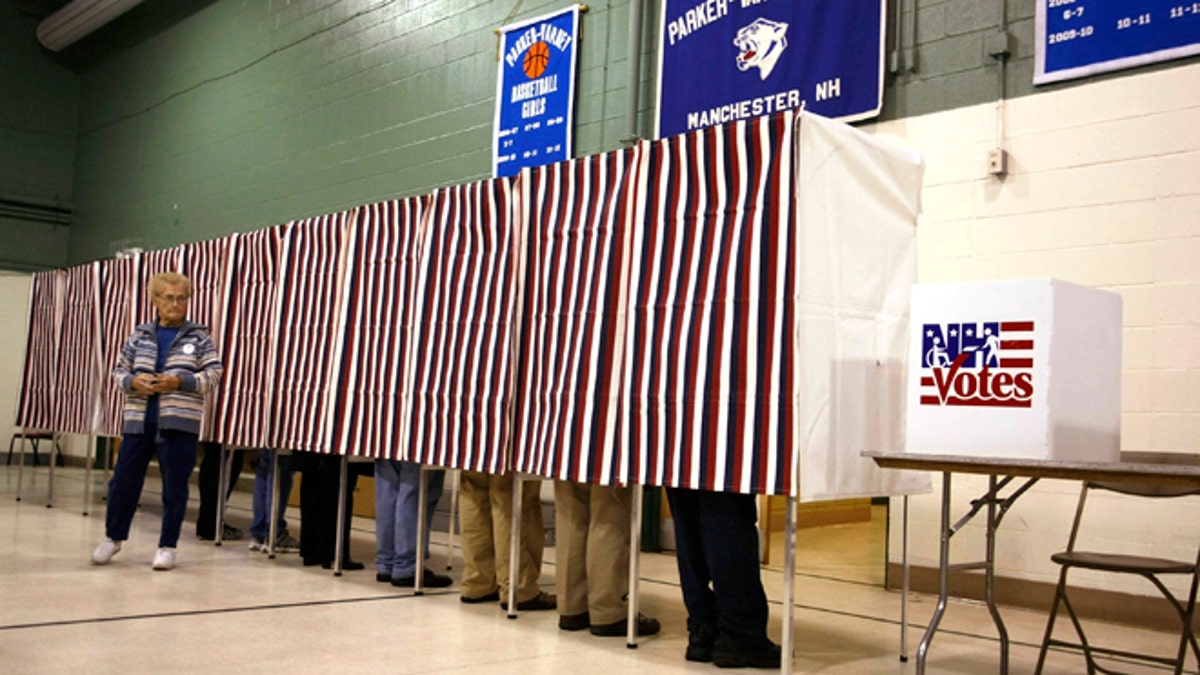
MANCHESTER, NH - JANUARY 08: Ballot Inspector, Rita Paris, keeps an eye on the voting booths as people vote at the Parker Varney School polling location on election day January 8, 2008 in Manchester, New Hampshire. Coming off a third place finish in the Iowa caucus Hillary Clinton is looking to rebound in the New Hampshire primary. (Photo by Joe Raedle/Getty Images) *** Local Caption *** Rita Paris (2008 Getty Images)
From the political left to political right. Front-runner to last place. Every pundit, party head and politician in this hectic and harried presidential campaign has espoused the importance of Latino voters to winning the nomination and ultimately the White House.
While there are Latino voters in every state on the union, political observers argue that Texas, Florida, Nevada and Colorado – states where the white vote is expected to be split between a number of candidates during the primaries – is where Hispanics will help decide who is on the ballot this year.
"Latino voters are virtually insignificant in the primary races unless there is a split among white voters," Luis Fraga, a professor of political science at the University of Notre Dame, told Fox News Latino.
In Texas, polling currently indicates a showdown in the Republican primary between Sen. Ted Cruz and real estate mogul Donald Trump when Lone Star state voters cast their ballots on Super Tuesday. The latest University of Texas/Texas Tribune poll has Cruz and Trump in a dead heat with each holding 27 percent of the vote, while former neurosurgeon Ben Carson sits in a distant third at 19 percent.
Cruz, who represents Texas in the U.S. Senate and draws strong support from the state's conservative base, looks to split the vote with Trump thanks to the magnate's growing backing of the Tea Party in Texas — making the 30 percent or so of Republican Latinos who vote in the primary a big factor come March 1.
While in many places with the right demographic a Latino last name is enough to edge someone to victory, experts say that Cruz's strict stance on immigration and other issues important to Hispanics cancels out his Cuban heritage at the polls.
"Cruz's background does not have the appeal to voters in Texas like Marco Rubio does in Florida," Fraga said.
Florida is another state where Latinos are deemed crucial in the Republican primary race, given the changing demographics of its Cuban-American population and the recent influx of Puerto Ricans fleeing the territory's economic woes.
Recent poll data from Florida Atlantic University has Trump holding a commanding lead of 31.5 percent among prospective voters in the Sunshine state, but analysts say that Rubio – who is currently in second with 19.2 percent of the vote – could pull of a win in his home state with the help of Latino voters.
With 471,000 registered Republican Latino voters out the total 4.2 million Republicans in Florida, Rubio stands to benefit from the disdain many Hispanics feel for Trump following his notorious immigration comments and Florida Gov. Jeb Bush's failure to make a strong comeback.
"A lot of people are divided over who they'll vote for," said Evelyn Perez-Verdia, a political analyst and founder of Political Pasión. "This is not going to be an easy race for Rubio, but if it comes down to him being one of the final candidates in a close race, he will win."
Three time zones away in Nevada, there is broad agreement that the burgeoning Hispanic population paired with its newly vested importance as an early voting state has many analysts and insiders warning candidates that, if they hope to lock down the Silver state, they have to listen to the concerns of Hispanic voters — namely on topics such as immigration reform, jobs and education.
"Nevada is a microcosm of what is happening in the U.S.," David Damore, a political science professor at the University of Nevada-Las Vegas and a researcher for Latino Decisions, told FNL. "That means increased diversification and increased urbanization."
While the most visible candidate in Nevada has been Democratic front-runner Hillary Clinton – setting up her ground game early and racking up big time endorsements from powerful unions – the GOP candidates are starting to ramp it up in a state that is nearly 28 percent Latino. Analysts note that they are making a more concerted effort than they did in the past, hosting town hall and neighborhood meetings, and making multiple visits to the state.
But they say the grassroots efforts evident in the Clinton camp, and to a lesser extent other Democratic candidates, is not there yet among Republicans.
"Jeb Bush is making a good effort here and so is Marco Rubio," Fernando Romero, the founder of Hispanics in Politics told FNL. "But even Bush and Rubio – the two best candidates for Latinos – are not doing enough outreach right now to win over the Latino vote."












































